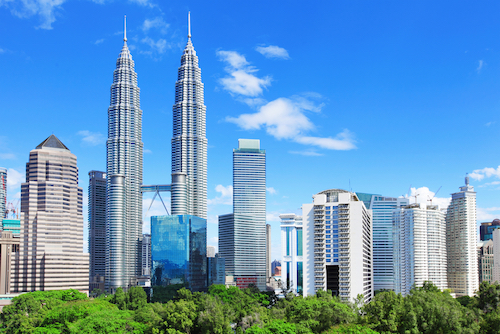Working in Malaysia is an attractive prospect for many expats, and there is a range of jobs available, particularly in cities such as Kuala Lumpur. Teaching, IT, tourism and finance are all potential sectors for expat employment. The Malaysian government is trying to encourage local companies to hire Malaysian personnel above overseas workers, so this may prove a barrier to certain types of employment as there is often a quota system in place and you may find that the sectors in which you are allowed to work as a foreign national are restricted.Your prospective employer will have to show that there is no qualified Malay who could undertake the job. Although Malaysia’s economy has been significantly growing in recent years, it has been slowing somewhat as we approach the 2020s, with Chinese demand for Malaysian exports falling, and a decrease in oil prices. However, skills shortages in some significant digital industries give hope to qualified expats who are seeking work in the region.
Malaysian job permits require quite a large degree of bureaucracy. Employers must first apply to the Immigration Department for a Visa with Reference (VDR) approval before employing foreign personnel. There are some age restrictions: overseas workers need to be under 50 if applying for a work permit.
The government also imposes a quota (also known as a dependency ratio ceiling, or DRC) on certain sectors and in addition imposes a levy. This is to encourage employers to hire local rather than foreign workers. Higher skilled foreign workers carry a lower rate of levy.
A VDR application must include:
• VDR application form
• quota approval letter from the Ministry of Home Affairs
• original receipt of payment for levy
• IM.12 and IM.38 Forms
• security bond: deposits / insurance guarantee / bank guarantee (the insurance guarantee must be stamped and valid for at least 18 months )
• copy of your passport
• 1 x recent photo
• medical certificates from the medical centre in your country of origin (valid for 3 months from the date of issuance)
• evidence of the Foreign Worker Compensation Scheme (insurance)
• evidence of an insurance policy from the Health Insurance Protection Scheme Foreign Workers (SPIKPA)
You must remain in your home nation while pending VDR approval from the Malaysia Immigration Department. You will then only be allowed to enter the country at authorized entry points using the VDR issued by the Immigration Department and the entry visa issued by the Malaysian Attachés Office in your country of origin. Your employer must ensure that the clearance process is done within 24 hours from your arrival time. You will then need to pass a medical check.

You can work for up to 10 years with the VDR, but you may wish to apply for permanent residency.
Fintech and e-commerce continue to grow in the region and there remains a skills shortage in these areas. Expats with expertise in computer and information technology, artificial intelligence, cyber security and data science may find themselves with an advantage. Experts suggest that personnel with a strong background in project management will also continue to find themselves in demand.
Mandarin speakers (or speakers of another Asian language) will find themselves at an advantage.
The Malaysian working week is 48 hours long, with a maximum of 8 hours a day and 6 days a week. Typical working hours are 9 a.m. – 5 p.m. with a break for lunch, from Mondays – Fridays although some businesses open on Saturdays, which brings the working hours up to their maximum.
Your annual holiday entitlement is 10 days per year but there are a large number of public holidays (ranging from 18-20 days depending on which region you are working in).
Maternity leave has just been extended to 90 days but this has not yet been ratified in law, so some private sector companies are still applying the old 60 day limit. You will need to have worked for your employer for a specified consecutive period prior to this. A further extension, plus paternity leave, has also been called for.

Recently the government is set to increase the minimum wage in 57 major cities from 1,100 ringgit (US$270) to 1,200 ringgit (US$295). The minimum wage in more rural areas will remain at the lower figure. Salaries are said by some calculations to average at around 102,980 ringgit (US$25.281) annually but if you are working in the finance sector, or have specialist skills, you are likely to be paid considerably more.
A foreign spouse is permitted to work in Malaysia without having to change their Social Visit Pass to the Employment Pass, on condition that the spouse has acquired work approval from the Immigration Department.
Job Vacancies
It is advised that you obtain a job offer before flying and it is also advisable to discuss a relocation package with your employer first, too. You can search online on one of the many job boards relating to vacancies in Malaysia, or approach a recruitment agency.
MalaysiaJobs.org has listings of job sites pertaining to the region.
It is also acceptable to approach a company directly.
Applying For A Job
A standard one page CV/resume is acceptable. It is a good idea to include a photograph. You may wish to get some of your headings, at least, translated into Malay.
The Malaysian constitution forbids discrimination against citizens based on sex, religion, and race. However, some forms of same sex relationships are still illegal even if the law is rarely enforced. There remain some racial tensions between groups.
Qualifications And Training
It is a good idea to have your list of qualifications translated, unless you are applying to an international company, and you may also wish to have any diplomas or certificates apostilled.
You may need to be put through a training course to qualify as a higher skilled worker: for example the Workplace Literacy and Numeracy (WPLN) listening and speaking assessments if you are applying to work in some areas of the hospitality industry.
Would you like to share your experience of life abroad with other readers? Answer the questions here to be featured in an interview!

